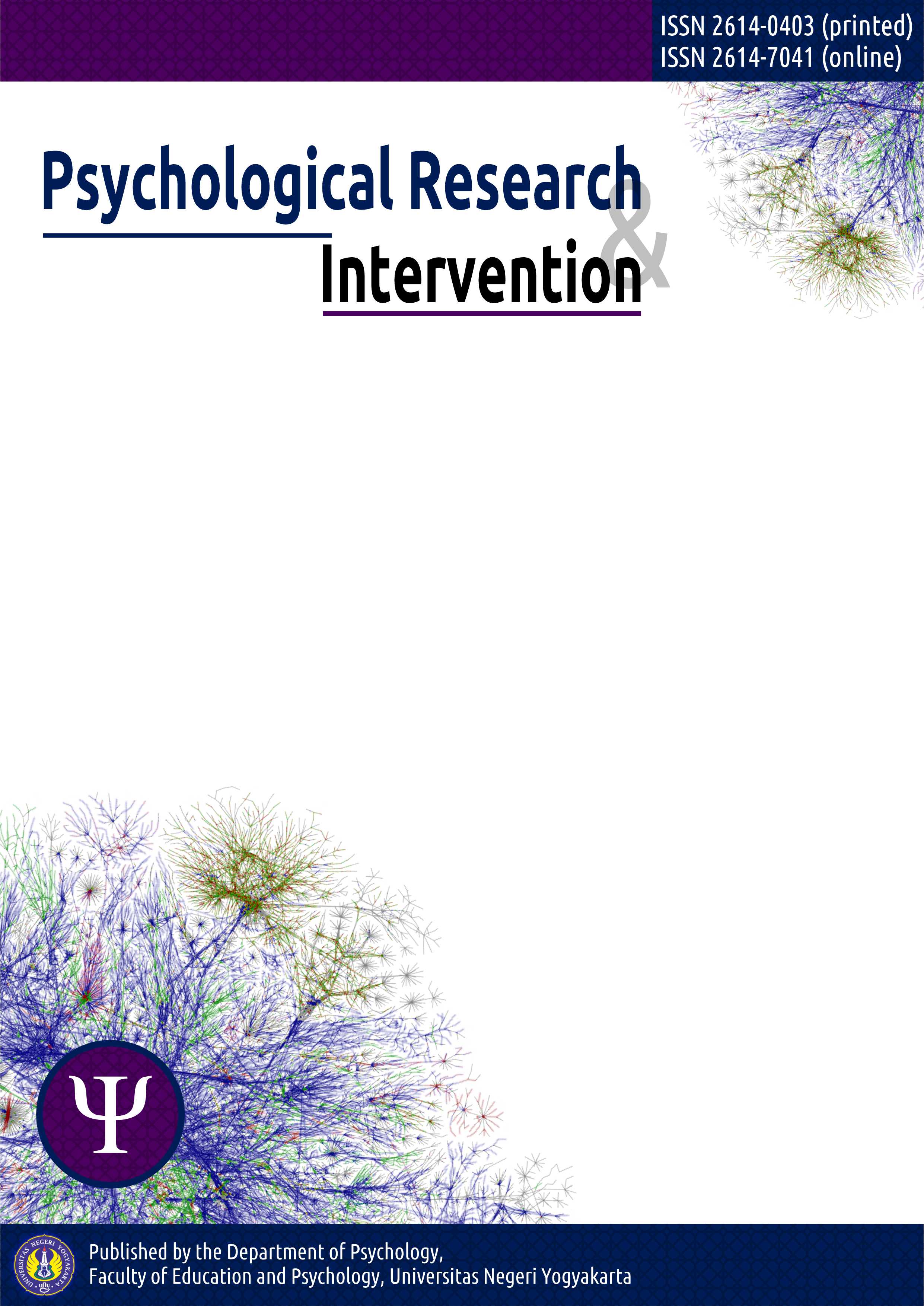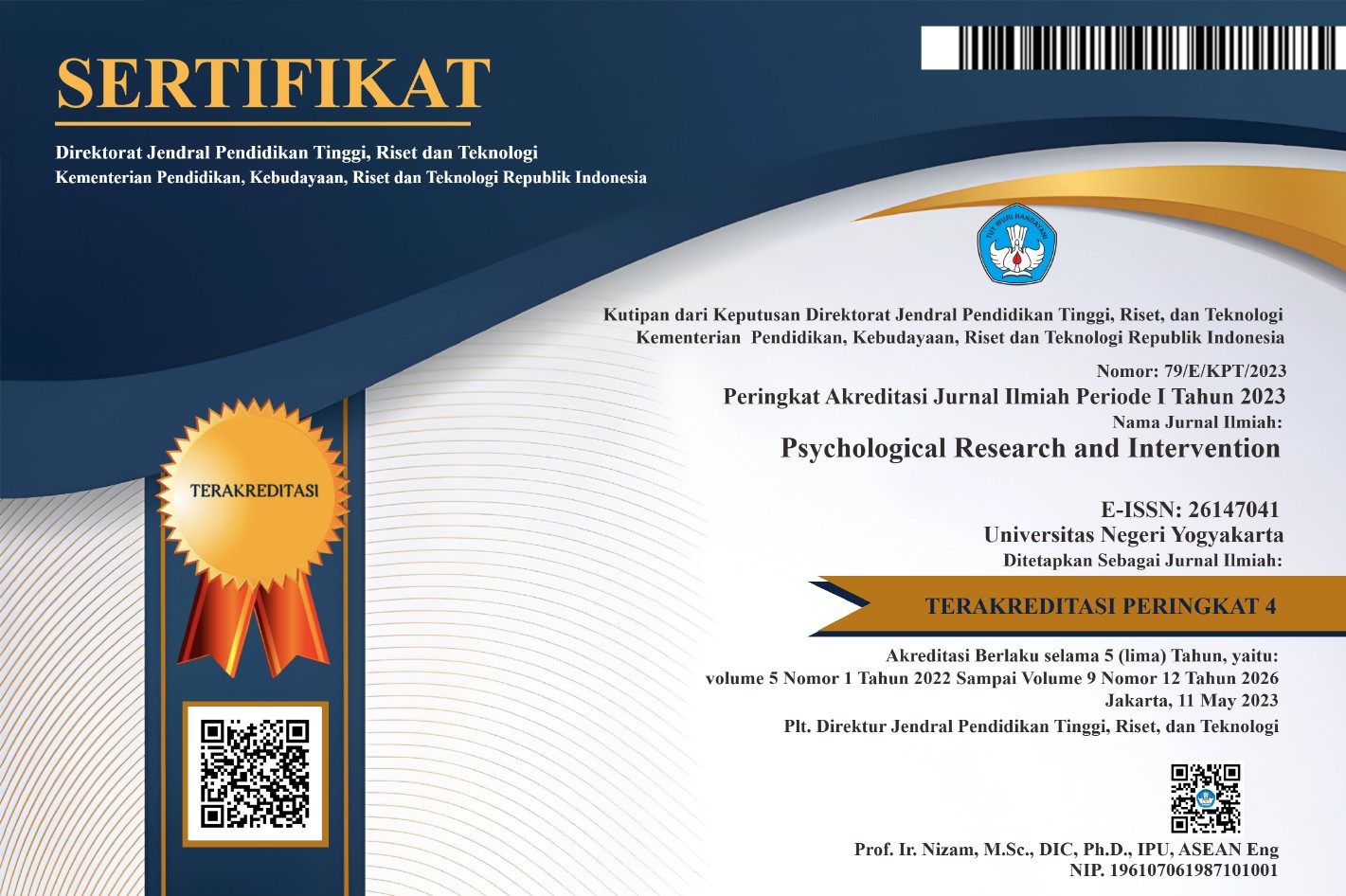Happiness of primary school teachers reviewed from the Big Five personality theory
DOI:
https://doi.org/10.21831/pri.v1i1.21194Keywords:
happiness, theory of personality, the Big FiveAbstract
This study aims to assess: (1) teachers' happiness level, (2) dimensions of teachers' personality, and (3) effect of the big five personality dimensions on the happiness of primary school teachers in Belik. The research applied a quantitative descriptive method with the ex-post facto approach. It took place at primary schools in Belik. The subject consisted of 210 primary school teachers in the District of Belik. The sample was established using the cluster random sampling technique. The data were collected through questionnaires, the big five was measured by an instrument called BFI, and PANAS-X and SWLS for data on happiness. The data were analyzed using the multiple regression at the significance level of 5%. The result of descriptive statistic analysis showed that: teacher's happiness in Belik was high, for the big five dimensions of personality, the highest was extraversion followed by agreeableness, conscientiousness, openness, and neuroticism. The statistics quantitavely suggested that the types of personality significantly affected the teacher's happiness. The Extraversion personality dimension gave contribution of 2.85%, agreeableness of 2.25 %, openness of 3.80% and neuroticism of 2.13% of happiness.
References
Albuquerque, I., Matos, M., et al. (2012). The interplay among levels of personality: The mediator effect of personal projects between the Big Five and subjective well-being. Journal Happiness Study, 14, 235–250.
Amiranti, C.C. (26 September 2016). Jaga gairah guru kalau mau pendidikan maju!. Kompas.com
Aziz, R. (2011). Pengalaman spiritual dan kebahagiaan pada guru agama sekolah dasar. Proyeksi, 6(2) 1-11.
Azwar, S. (2012). Reliabilitas dan validitas. Yogyakarta: Pustaka Pelajar.
Bestari, A.W. (2015). Perbedaan tingkat kebahagiaan pada mahasiswa strata 1 dan strata 2. Seminar Psikologi & Kemanusiaan, Universitas Muhammadiyah Malang.
Bruck, C.S. & Allen, T.D. (2003). The relationship between Big Five Personality Traits, negative affectivity, type A behaviour, and work-family confict. Journal of Vocational Behavior, 457-472. DOI:10.1016/S0001-8791(02)00040-4
Carr, A. (2004). Positive psychology. Hove and New York: Brunner-Routledge Taylor and Francis Grop.
DeNeve, K.M. & Cooper, H. (1998). The happy personality: Meta anlysis of 137 personality traits and subjective well-being. Pshychogical Bulletin, 124(2), 197-229.
Kandler, C. (2012). Nature and nuture in personality development: The case of neuroticism and extraversion. Current Directions in Psychological Science, 290-296.
McCrae, R.R. & Costa, P. (2006). Personality in adulthood: A five-factor theory perspective. New York, NY: The Guildford Press.
Rubin, K. H. & Burgess, K.B. (2001). Social withdrawal and anxiety. In M. W. Vasey & M. R. Dadds (Eds.), The developmental psychopathology of anxiety (pp. 407-434). New York, NY: Oxford University Press.
Seligman, M.E.P. (2002). Authentic happiness. New York, NY: Free Press.
Smith, T.W. (2007). Job satisfaction in the united states. Chicago, IL: University of Chicago.
Sugiyono. (2015). Metode penelitian pendidikan pendekatan kuantitatif, kualitatif, dan RnD. Bandung: Alfabeta.
Undang-Undang Republik Indonesia Nomor 14 Tahun 2005 tentang guru dan dosen dan peraturan Mendiknas Nomor 11 Tahun 2005 beserta penjelasannya. 2006. Bandung: Penerbit Citra Umbara.
Watson, D., Clark, L., & Tellegen, A. (1988). Development of breif measures of positive and negative affect: The PANAS scales. Journal of Personality and Social Psychology, 54, 1063-1070.
Watson, D., Clark, L., & Tellegen, A. (1994). The PANAS-X: Manual for the positive and negative affect schedule-expaned form (Unpublished manuscript). Iowa City, IA: University Of Iowa.
Yazdi, A.M.T. (2015). Empowerment potential: Big Five personality traits and psychological empowerment. International Business and Management. 11(3), 62-69.












